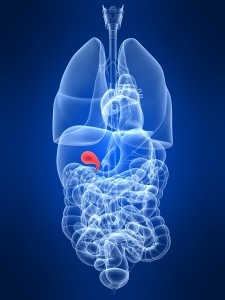 Gallstones are hardened deposits of digestive fluid that can form in the gallbladder, which is a small, pear-shaped organ on the right side of the abdomen, just beneath the liver. Gallstones can range in size from as small as a grain of sand to as large as a golf ball and affect as many as 20 million people in the United States. Typically people who develop symptomatic gallstones require surgery to remove the gallbladder. Risk factors include being female, being overweight or obese, a high fat or low fiber diet, and having diabetes. According to a new study from the Karolinska Institute in Sweden, crash dieting also tends to increase the risk of developing gallstones. The researchers explained that rapid weight loss induced by very low calorie diets impacts the cholesterol and salt contents of bile, as well as the emptying of the gallbladder–both of which can contribute to gallstones.
Gallstones are hardened deposits of digestive fluid that can form in the gallbladder, which is a small, pear-shaped organ on the right side of the abdomen, just beneath the liver. Gallstones can range in size from as small as a grain of sand to as large as a golf ball and affect as many as 20 million people in the United States. Typically people who develop symptomatic gallstones require surgery to remove the gallbladder. Risk factors include being female, being overweight or obese, a high fat or low fiber diet, and having diabetes. According to a new study from the Karolinska Institute in Sweden, crash dieting also tends to increase the risk of developing gallstones. The researchers explained that rapid weight loss induced by very low calorie diets impacts the cholesterol and salt contents of bile, as well as the emptying of the gallbladder–both of which can contribute to gallstones.
For the study, information from 6,640 dieters was collected from a weight loss company in Sweden. Half of the dieters had been on a “crash diet”, while the other half went on a low calorie diet. The “crash dieters” had liquid meals of just 500 calories a day for 6-10 weeks, followed by the gradual introduction of normal food, and then nine months of a weight maintenance program of healthy eating and exercise. The low-calorie dieters consumed 1,200-1,500 calories a day, including two liquid meals for three months, followed by the nine month weight maintenance phase.
In terms of weight loss, at 3 months the “crash dieters” lost around 30 pounds, while the low-calorie dieters lost about 17 pounds. At one year, the extremely low calorie group had lost an average of roughly 24 pounds, while the other group lost about 18 pounds. When the researchers looked at the prevalence of gallstones in the groups, they noticed a substantial difference. Forty-eight people on the “crash diet” developed gallstones requiring hospital treatment. Just 16 people in low-calorie diet group developed gallstones.
While the cause of the increased risk of gallstones is beyond the scope of the study, the researchers suggested that one contributing factor was that the “crash dieters” lost more weight during follow-up. Another potential factor may be a lower fat intake among in the “crash dieters”. The authors say that this study emphasizes the importance of engaging in a risk/benefit discussion with your physician before embarking on an extremely low-calorie diet. While weight loss often has positive health benefits, the method of weight loss will affect both the side effects it has, as well as the chance of maintaining that weight loss. Crash dieters may seem to lose an impressive amount of weight at first, but often that weight comes right back.
We spoke with Dr. Laura Machado, expert bariatric surgeon in Sacramento, about the study. She said, “Crash dieting alone is a short term weight loss endeavor that can leave a more permanent problem. Rarely, if ever, are these patients able to maintain their weight loss. The Swedish diet study emphasized something we often see in weight loss surgery patients: the development of gallstones due to the less frequent emptying of the gallbladder in response to a decreased meal frequency and fat intake. The use of very low calorie diets can produce remarkable weight loss. The use of very low calorie diets in bariatric surgery patients is a mainstay of the effects of the surgery on meal restriction, metabolism, and hunger.
We have all seen gallstones develop in our bariatric surgical patients after massive weight loss. Undergoing cholecystectomy at that point is generally well received by the patients because they have experienced so many positive physical and emotional benefits of their surgery. The higher risk of requiring gallbladder surgery in the crash dieting group is expected, but given that almost none will be able to maintain their weight loss long-term certainly questions the risk/benefit consideration of these diets,” Dr. Machado concluded.
Related Reading: Going to Extremes






Nutrition & Lifestyle